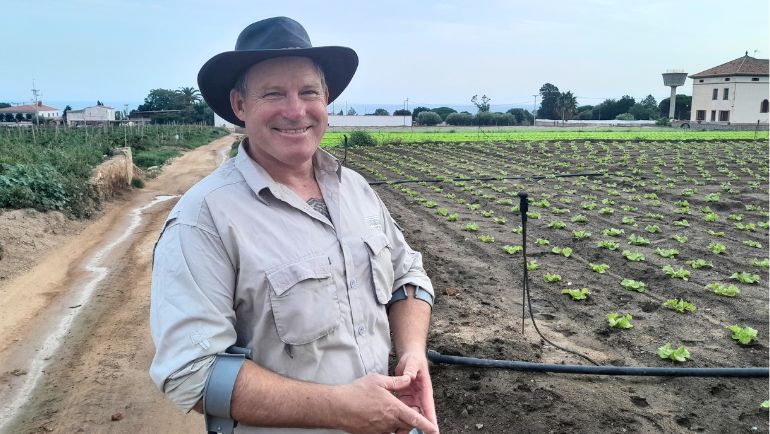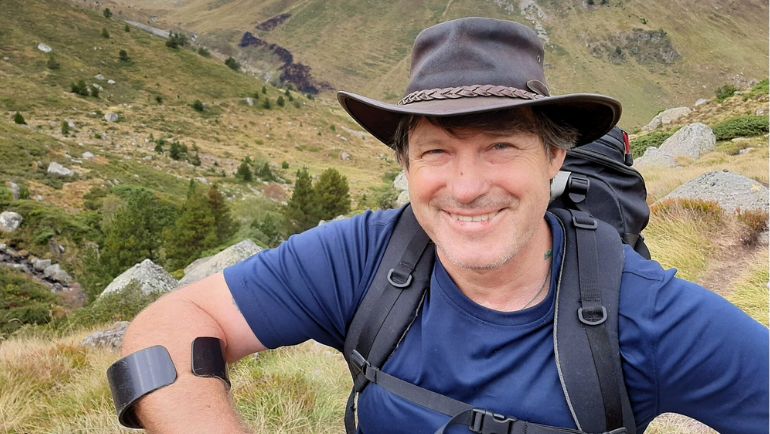Will's journey

Content warning: This personal story contains references to suicidal thoughts and mental health struggles.
In 1997, Will was in a major motor vehicle accident that changed the course of his life. He lost his right leg at the hip and sustained a brain injury, spending six weeks in a coma. When he woke up, the physical pain was overwhelming, but it was the invisible impacts of brain injury that would shape his journey for decades to come.
“I woke up skin and bone and in extraordinary pain… I couldn’t use my left arm for six months after I came out of hospital. But I hid it because I was so ashamed. Typical bloke mentality. I felt I was half a man. I had to overcompensate and prove myself,” said Will.
Falling through the cracks
Will was determined to move on and rebuild his life. But beneath the surface, he was struggling with the symptoms of his brain injury.
“When I had my accident, I sort of… fell in between the cracks. You know what I mean? I know my life would have been so different if I had organisations like Synapse, just someone to help navigate life after. There was so much misunderstanding. I was stubborn and just wanted to get out of hospital.”
Instead, Will pushed forward alone, navigating his new life while trying to cope with fatigue, memory loss, cognitive overload and emotional distress, without knowing why these things were happening.
“If I had known and got support, my life and the challenges that I went through after the accident could have been avoided.”
Living with the invisible
The psychological toll of undiagnosed brain injury became unbearable. Will describes experiencing such severe cognitive overload that he felt like he was losing control.
“I felt as if I were in a perpetual cycle of stumbling and picking myself up constantly.” I went to the gap** three times in Sydney to jump, just to make it stop. You know, if I had to make two decisions at once, I couldn’t deal with it. My head would just go out of control, and I’d be in the corner just punching my head for it to stop because there would be all this lightning sort of going off.”
He struggled with memory and communication and felt ashamed of his challenges.
“Even with my friends, I’d say ‘Look, I have a brain injury,’ but I was so confused. I’d forget everything. I’d meet you today and tomorrow not know who you were.”
It’s an experience he knows others can relate to, particularly those who end up in the justice system.
“There’s a lot of people in jail that actually now have been diagnosed with traumatic brain injury. I totally get that, I understand, like that I was never in jail, but I totally get that. The overwhelm and not being able to feel like you are part of…you’re just lost.”

Finding support
Years later, while working on a TAFE farm in Albury, Will started a Diploma of Organic Agriculture.
“It was there that I was required to show if I could drive a tractor with one leg on the TAFE farm. I could drive the tractor, and they asked me if I had any other disabilities, which then took me on my road of recovery. I am forever indebted to that farm and my mentors, and the community.”
After Will’s employer at the farm suggested he see someone about his brain injury, Will went to the brain injury rehabilitation unit in Albury.
“Bloody awesome people! Like it changed my life. It literally changed my life! They said, well, why haven’t you got help before?”
They organised a neuropsychological assessment that finally gave him the confirmation and understanding he’d gone without for so long.
“They said, ‘Yeah Will, you’ve got a brain injury. We can help you with that. That’s why this, that’s why that. And I went home, and I cried. Because it was like, oh! they understood.”
With that support, Will began working with a speech therapist, started university, and started to rebuild his life with greater self-awareness and compassion.
“I then completed the Diploma of Organic Agriculture at the Riverina TAFE, and I have to say, my mentors on the farm were amazing. Because I completed the Diploma, it enabled me to apply for the Bachelor of Ecological Agriculture, which I completed at Charles Sturt University. The TV program This Time Next Year contacted me out of the blue, and I told them I wanted to complete the degree. I did, and it was bloody amazing, and so bloody hard!! I studied part-time, and it took several years. The program contacted me at the right time, hey.”
“It was later that I started an Honours in Research at the Southern Cross University in Environmental Science, majoring in Regenerative Agriculture. I completed it and was fortunate enough to be published, but I know I wouldn’t have if not for the community around me; it was such a challenge! Again, I studied part-time, and now, I am thinking about completing a PhD.”
Will has developed a powerful way of explaining the daily reality of living with a brain injury.
“I explain it like a laptop where four keys don’t work, like 6, 2, S, and P. Try using a computer like that. You have to constantly find a way around.”
Will’s also learned strategies to manage word-finding issues and memory gaps.
“I close my eyes to remember words or ask for help when I lose them. Before, I just felt stupid. Now, I understand what’s happening.”
For Will, nature has been healing and working in sustainable agriculture gives him purpose.
“My dreams now are to undertake a PhD, become an expert in my chosen field of agroecology and natural systems… and most of all, learn and live a happy life.”
Advice
Will wants others living with a brain injury to know they’re not alone and that support makes all the difference.
“Reach out. Get support. Don’t try to navigate it on your own. The support you can get can explain why things aren’t working the way you remembered. Rather than being in a corner, punching your head to try to make sense of something, you can voice it, get guidance, and move forward.”
“Get help with things like making decisions you know, like, is this a good decision or not? Do you have the capacity to feel like, OK, you can make that decision, that’s fine, but have you thought about the whole thing. You know, rather than just going. OK, I’m gonna do it. You know, without understanding the consequences of going down that path. For me, the thing was feeling stupid and the overwhelm because I just honestly felt stupid. You know, I’m not gonna get anywhere. I can’t because it’s either too overwhelming or I can’t think of the word. I can’t remember.”
Will’s passionate about the role Synapse and other organisations can play in helping people find understanding and stability.
“That’s why it’s so important, what you guys are doing. Helping those people who are in those situations, incarceration, athletes, or anyone with a brain injury, just to have understanding and foundation to go ahh this is why. And now we can navigate from here.”
For Will, the journey continues. But now, he walks it with insight, purpose, and hope.
“I’m still a long way there, but I made it this far. And I’ll keep going.”
** The Gap is an ocean cliff at South Head in the Eastern Suburbs of Sydney.